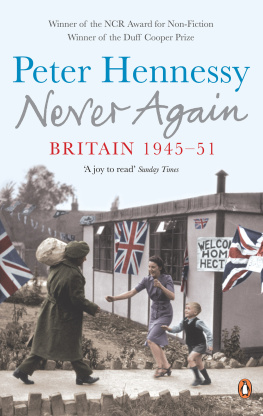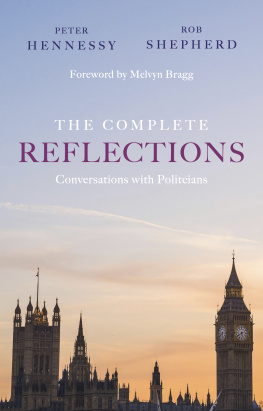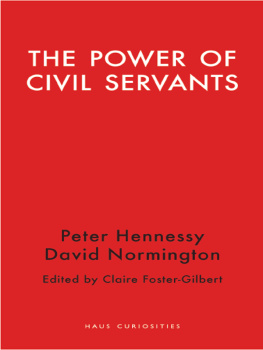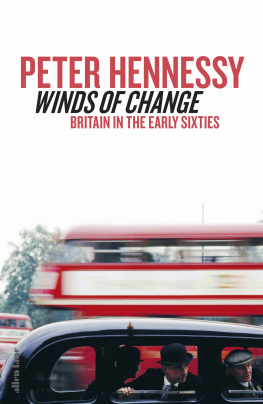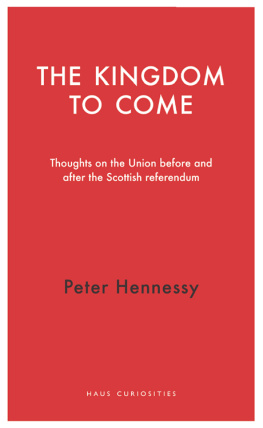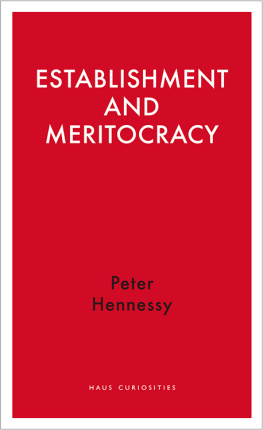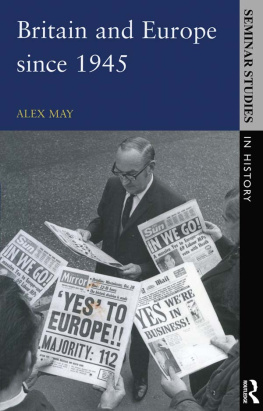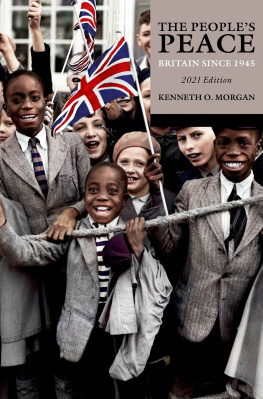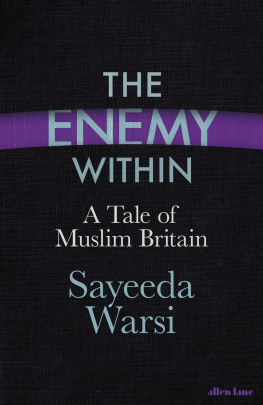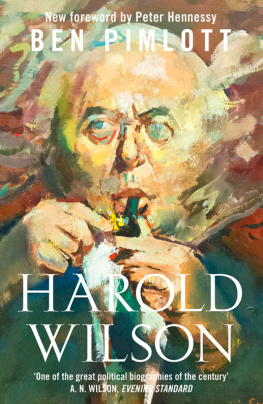About the Author
Peter Hennessy is one of Britains most celebrated historians, who has himself become something of a national institution (Ben Pimlott). He is Attlee Professor of Contemporary British History at Queen Mary, University of London. His books include the next two in his post-war trilogy: Having it So Good: Britain in the Fifties (2006, winner of the Orwell Prize for Political Writing) and Winds of Change: Britain in the Early Sixties (2019), as well as Cabinet (1986), Whitehall (1989), The Prime Minister: The Office and Its Holders Since 1945 (2000), The Secret State: Preparing for the Worst (2002, 2010) and, co-authored with James Jinks, The Silent Deep: The Royal Navy Submarine Service Since 1945 (2015, winner of the Duke of Westminsters Award for Military Literature and the Mountbatten Maritime Award). He was elected a Fellow of the British Academy in 2003 and created an independent crossbench life peer as Lord Hennessy of Nympsfield in 2010.
Peter Hennessy
NEVER AGAIN
Britain 19451951

PENGUIN BOOKS
UK | USA | Canada | Ireland | Australia
India | New Zealand | South Africa
Penguin Books is part of the Penguin Random House group of companies whose addresses can be found at global.penguinrandomhouse.com.

First published by Jonathan Cape Ltd 1992
Published in Penguin Books 2006
Reissued 2020
Copyright Peter Hennessy, 1992
The moral right of the author has been asserted
Cover photograph Harry Todd/Getty Images
Lyrics from Who Do You Think Youre Kidding Mr Hitler by Jimmy Perry/Derek Taverner 1969 Veronica Music Ltd, 8/9 Frith Street, London, W1V 5TZ are used by permission; all rights reserved. Lyrics from Have a Go Joe by Jack Jordan 1946 Cinephonic Music Co. Ltd., 8/9 Frith Street, London W1V 5TZ are used by permission; all rights reserved. Lyrics from Mad Dogs and Englishmen 1932 Chappell Music, London W1Y 3FA , are used by permission of International Music Publications. Extract from Farewell the Trumpets by James Morris reprinted by permission of the Peters Fraser & Dunlop Group Ltd.
ISBN: 978-0-141-92932-3
This ebook is copyright material and must not be copied, reproduced, transferred, distributed, leased, licensed or publicly performed or used in any way except as specifically permitted in writing by the publishers, as allowed under the terms and conditions under which it was purchased or as strictly permitted by applicable copyright law. Any unauthorized distribution or use of this text may be a direct infringement of the authors and publishers rights and those responsible may be liable in law accordingly.
For a sextet of teachers at Marling School who had a big influence on my personal history Cyril Campbell, Michael Gray, Eric Pankhurst, Peter Young, Oliver Wicks and L.E. Godfrey-Jones

1
Who Do You Think
You Are Kidding?
Who do you think youre kidding, Mr Hitler,
If you think Old Englands done?
We are the boys who will stop your little game,
We are the boys who will make you think again.
Bud Flanagan, 1969
In the Second World War the British people came of age. This was a peoples war Few now sang Land of Hope and Glory. Few even sang England Arise. England had risen all the same.
A.J.P. Taylor, 1965
England is the most class-ridden country under the sun. It is a land of snobbery and privilege, ruled largely by the old and silly. But in any calculation about it one has got to take into account its emotional unity, the tendency of nearly all its inhabitants to feel alike and act together in moments of supreme crisis.
George Orwell, 1941
There is a total gulf in politics today, among Cabinet colleagues, between those who were brought up in the 1930s and served in the war, and those who didnt. Its a very strange and almost indefinable difference.
Lord Whitelaw, 1988
The Second World War and Britains part in it is one of the most heavily ploughed patches of our history. It would be impossible and pointless for me to crawl over every square foot of a vast field. I shall concentrate, therefore, on a few themes and occasional episodes which are essential to understanding the condition of Britain, its people and its politics, when the postwar period begins. Such a crowded seven-year stretch from Munich to Lneberg Heath (where Montgomery took the German surrender) cannot be tackled in a single dash. I have divided it into three sections The Beginning, from Munich to the fall of Neville Chamberlain; The Shock-Absorber, covering the Battle of Britain and the Blitz, the critical year when Britain stood alone between Germany and Hitlers aim of a Nazi-dominated Europe; and The Long Haul, the endless slog on the battlefields, the oceans, in the air and in the factories of the Home Front until the white flags appeared along the Wehrmachts front-line.
PART ONE: The Beginning, 193840
My son would stay at school and go to Oxford in the autumn. My home and children, like all the other homes throughout the country, would be spared It was as if we had come to the edge of a precipice and then by some miracle had been pulled back to safety. Yet when we met to discuss the true situation and to hear the reflections of those whose judgment we trusted, we began to see beyond the fragile screen of complacency and self-deception, skilfully designed to delude a whole people and lull them into a fictitious sense of security.
Harold Macmillan on Munich, September 1938
I was at home, having just returned from camp, and was eating a late breakfast of bacon and fried bread. I was alone, the rest of the family having gone to Church, but I had the radio and the cat for company. As I listened to the sepulchral tones of Mr Neville Chamberlain I realized things had gone from bad to worse in my absence, and when he finished, the ominous wail of the air-raid sirens began, I put down my knife and fork and went over to the window, I could see the balloons all going up into the sky like lifts, until hundreds of these silver sausages floated over London. This is it, I told the cat, and realizing that I could do nothing about it, we both sat down to breakfast again, I to my bacon, he to his rinds.
Captain E.G.M. Roe, recalling 3 September 1939
All you could hear was the feet of the children and a kind of murmur because the children were too afraid to talk. We had a big banner with our number in front Mothers werent allowed with us but they came along behind. When we got to the station we knew which platform to go to, the train was ready, we hadnt the slightest idea where we were going and we put the children on the train and the gates closed behind us. The mothers pressed against the iron gates calling, Goodbye darling. I never see those gates at Waterloo that I dont get a lump in my throat.
A schoolteacher recalling the Great Evacuation of September 1939
The PM has come back from the Palace The King has sent for Winston Alec [Home] and I went over to the FO to explain the position to Rab [Butler], and there, with Chips [Channon], we drank in champagne the health of the King over the Water [Chamberlain]. Rab said he thought that the good clean tradition of English politics, that of Pitt as opposed to Fox, had been sold to the greatest adventurer of modern political history.

